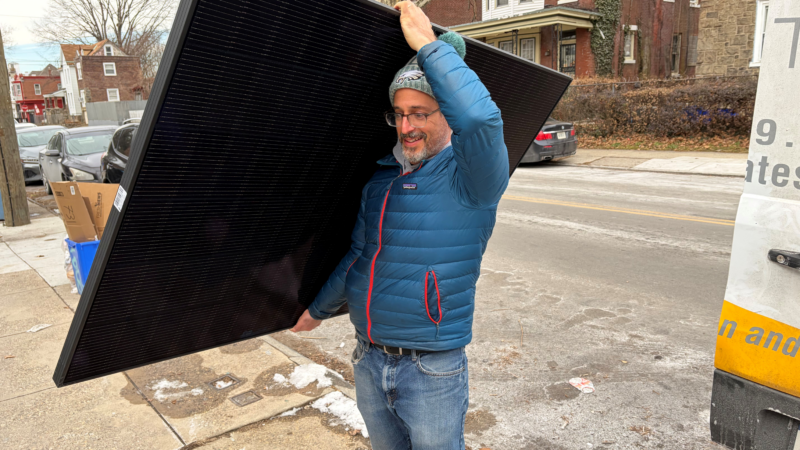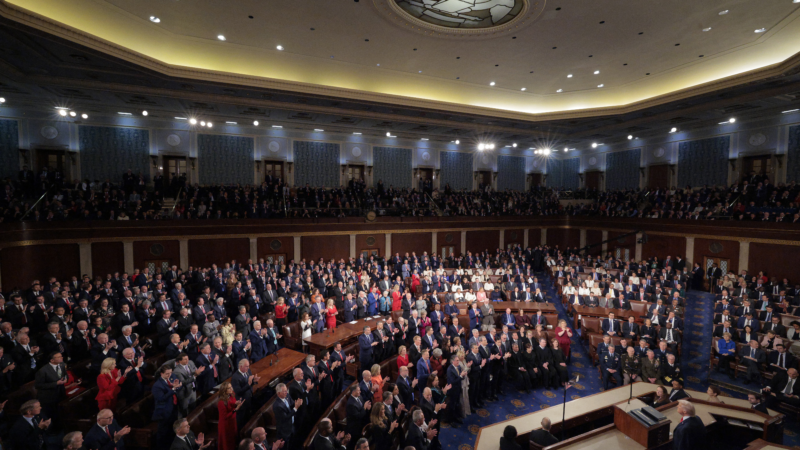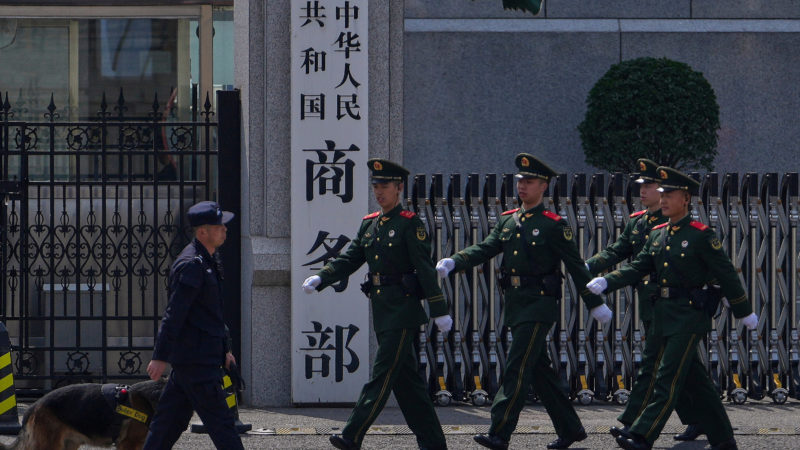Trump promised a ‘golden age’ for the economy. Then he unveiled tariffs
As President Trump marks his 100th day in office this week, there’s not much to celebrate about the U.S. economy.
Economic growth appears to be slowing. The stock market has dropped sharply. And consumer confidence has tumbled to its lowest level since the onset of the COVID-19 pandemic.
That hardly looks like the new “golden age” the president promised on Inauguration Day just over three months ago.
Figures to be released by the Commerce Department on Wednesday are expected to show that the United States’ gross domestic product grew much more slowly in the first quarter of the year, compared with the final months of 2024.
The quarterly GDP report covers the final weeks of the Biden administration and the early months of Trump’s term, including the first rumblings of the president’s new trade war.
Growth was dragged down in part by a surge of imports, as businesses and consumers raced to stock up before Trump’s sweeping tariffs took effect in early April. Imports are a net negative for GDP.
Americans are feeling antsy
Forecasters think personal spending also slowed during the first quarter, after robust growth at the end of last year.
“Consumers continued driving the train but with much less gusto than they have been up until now,” said Mark Zandi, chief economist at Moody’s Analytics.
An index of consumer confidence, compiled by the nonprofit Conference Board, has fallen for five straight months, and tariffs have now eclipsed inflation as a top concern. Many of those surveyed say they’re worried that Trump’s import taxes will raise prices and possibly drag the economy into a recession. The forward-looking elements of the confidence index are already well below the level that typically signals a looming recession.
“At the end of the day, recession is about a loss of faith,” Zandi said. “Consumers lose faith that they’re going to be able to hold onto their job, and they cut back on spending and we go into recession.”
While the job market has so far held up well, with an unemployment rate of just 4.2% in March, the Conference Board’s survey found expectations about the job market are the worst since 2009, when the economy was hemorrhaging hundreds of thousands of jobs every month.
The falling stock market has also taken a toll on confidence. As of Tuesday, the S&P 500 index was down 7.3% since Inauguration Day, while the tech-heavy Nasdaq was down 11%. It’s the market’s worst performance at the start of a new presidency since the 1970s.

Businesses are navigating the uncertainty
Trump has imposed 10% taxes on nearly everything the United States imports, along with tariffs of 145% on many goods from China. The president has also called for additional tariffs — only to suspend them — leaving many businesses and consumers uncertain about what import taxes will look like in the future.
Curt Carpenter is one of those in wait-and-see mode, hoping the tariffs turn out to be “a lot of bluster and a lot of brinkmanship.”
Carpenter runs a furniture and lighting store in Boston and imports most of his lighting fixtures from China. He said the tariffs have been worse for his business than the 2008 housing crisis.
“At the end of the day, it’s just a tax on the end consumers,” Carpenter said. “We’re definitely losing business. But we’re not losing it to a competitor. We’re just losing the opportunity for a sale.”
But tariffs do have supporters
Some businesses are cheering for the tariffs, though.
Tom Barr, a third-generation mold maker in Michigan, makes plastic injection molding equipment for the auto industry, among others. He’d been losing business to competitors in China but said since Trump’s triple-digit tariffs took effect, he has had four phone calls from potential customers, exploring the possibility of bringing their orders home.
“Somebody reached out to us from Ford Motor Company,” Barr said. “They’re investigating it. They’re not saying they’re going to do anything, but they want to know what their options are. So without these tariffs, those phone calls wouldn’t even have taken place.”
Barr thinks tariffs could be more narrowly targeted, however, to boost domestic producers without placing an undue drag on the broader economy.
When a horse whinnies, there’s more than meets the ear
A new study finds that horse whinnies are made of both a high and a low frequency, generated by different parts of the vocal tract. The two-tone sound may help horses convey more complex information.
Trump’s many tariff tools mean consumer prices won’t go down, analysts say
The Supreme Court struck down President Trump's signature tariffs. But the president has other tariff tools, and consumers shouldn't expect cheaper prices anytime soon, economists say.
Hundreds of American nurses choose Canada over the U.S. under Trump
More than 1,000 American nurses have successfully applied for licensure in British Columbia since April, a massive increase over prior years.
Tax credits for solar panels are available, but the catch is you can’t own them
Rooftop solar installers are steering customers toward leases instead of purchases. Federal tax credits for purchased systems have ended but are still available for leased ones.
5 takeaways from Trump’s State of the Union address
President Trump hit familiar notes on immigration and culture in his speech Tuesday night, but he largely underplayed the economic problems that voters say they are most concerned about.
China restricts exports to 40 Japanese entities with ties to military
China on Tuesday restricted exports to 40 Japanese entities it says are contributing to Japan's "remilitarization," in the latest escalation of tensions with Tokyo.






